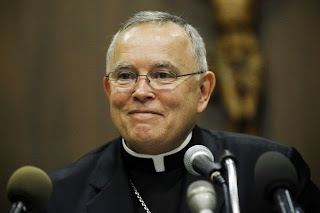I love Archbishop Chaput. He always seems to hit the nail on
the head. On June 22 he gave a speech honoring St. Junipero Serra. He speaks of
our mission, the new evangelization, St. Francis and Fr. Serra. It is
excellent. Below is an excerpt. I hope it encourages you to read the whole
speech. It can be found here.
The “how” of a New Evangelization,
or any evangelization, needs to begin with our own repentance
and conversion. That hasn’t changed since Father Serra walked the Camino Real,
the trail that linked California’s missions. We can’t give what we don’t
have.
As individuals, we control very
little in life; but we do control what we do with our hearts. We can at
least make ourselves available to God as his agents. Personal conversion is the
essential first step. It immediately affects the people around us.
The “how” also requires us to
understand the real human terrain we’re called to convert.
Christian Smith, Notre Dame’s
distinguished social researcher, suggests that the de facto dominant
religion among American teenagers today is “moralistic therapeutic
deism.” And he frames the creed of this new religion in this way:
First, a God exists who created and
orders the world and watches over human life on earth. Second, God wants people
to be good, nice and fair to each other, as taught in the Bible and most world
religions. Third, the central goal of life is to be happy and to feel good
about oneself. Fourth, God doesn’t need to be particularly involved in one’s
life, except when he’s needed to fix a problem. And, fifth, good people go to
heaven when they die.
“Teen religion” largely derives
from the world of adult religion, especially parental religion, and it flows
naturally from what the parents of these teens actually practice. Old
patterns of religious faith among many adults have faded into a kind of vague
“spirituality,” which then shapes the world into which American adolescents are
socialized.
For many young people, the
moralistic part of “moralistic therapeutic deism” simply means being pleasant
and responsible, working on “self-improvement,” taking care of one’s health and
doing one’s best to succeed. “Therapeutic” means focusing on feeling good and
happy, being secure and at peace. It’s about subjective well-being and getting
along amiably with other persons. And “deism” means that God exists — he
created our world — but he’s not particularly involved in our affairs,
especially when we don’t want him around. He’s available to meet our needs.
He’s not demanding on us, but we can be demanding on him.
Obviously, very little of this has
anything to do with the Gospel of Jesus Christ or the faith of the martyrs. And
that’s a problem.
In practice, American society now
breeds a kind of radical self-focus and practical atheism — not by refuting
faith in God, but by rendering God irrelevant to people’s needs and urgencies
of the moment.
As Christopher Lasch saw in The
Culture of Narcissism, consumer culture tends to create weak
personalities dependent on group behavior and approval — and therefore more
susceptible to advertising and product consumption. The hard and social sciences
replace the clergy as a source of guidance and meaning. And social media and
mass entertainment abolish solitude and personal reflection.
So, in an age of massive
self-absorption, the result is that real individuality and self-mastery are
withering. Why? Because the communities that root and shape an individual in
distinctive moral codes and histories — in other words, our families, churches,
synagogues and fraternal organizations — can’t compete with the noise and flash
of consumer society.
Here’s what that means for all of
us as believers: A “new” evangelization must start with the sober
knowledge that much of the once-Christian developed world, and even many
self-described Christians, are in fact pagan.
Christian faith is not a habit.
It’s not a useful moral code. It’s not an exercise in nostalgia. It’s a
restlessness, a consuming fire in the heart to experience the love of Jesus
Christ and then share it with others — or it’s nothing at all.
Mastering the new social and
demographic data that describe today’s world, and the new communications tools
to reach it, are vitally important for the Church.
But nothing can be accomplished if
we lack faith and zeal ourselves. We — and that means you and I — are the means
God uses to change the world. The material tools are secondary. People, not things,
are decisive.






No comments:
Post a Comment